#(it does serve to further his lore but in meta they also needed a reason to be at the dragon for the eye creature to sail in)
Explore tagged Tumblr posts
Text
almost a week without q!foolish and two days without cc!foolish

#i wonder if he's in lore jail with the others or not#cause like. he does already have lore waiting for him at his dragon (message from agent 18)#but also that could be there to fix the continuity error caused by the server rolling back to a time before purgatory#and the cucu stream where agent 18 was told to leave a message#(it does serve to further his lore but in meta they also needed a reason to be at the dragon for the eye creature to sail in)#i doubt he'll have big coming back lore or he's still stuck in purgatory with baghz cell and others but i live on pure copium
2 notes
·
View notes
Text
Tangled Salt Marathon - Lost and Found
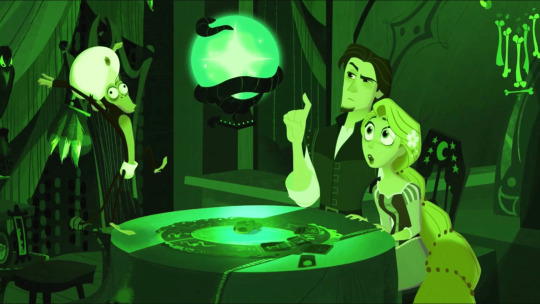
Another plot episode and another mountain of missed opportunities, failed set ups, and foreshadowing that goes nowhere. But outside of that it’s pretty entertaining. Are we seeing a pattern yet?
Summary: Rapunzel and Eugene go on a journey to retrieve the fourth and final piece of the scroll that will lead them to the Dark Kingdom. They receive help from Vigor the Visionary, who reveals himself to be Lord Demanitus himself, the author of the scroll depicting the purpose of the Sundrop and Moonstone. He leads them to the maze that he hid the last piece of the scroll in. Guiding them through the maze, they obtain the last piece, which united the four into one singular map. As they are about to leave, they are attacked by a stone monster.
Maybe That’s Why You Should Have Brought the Only Person Who Can Read It Along?!

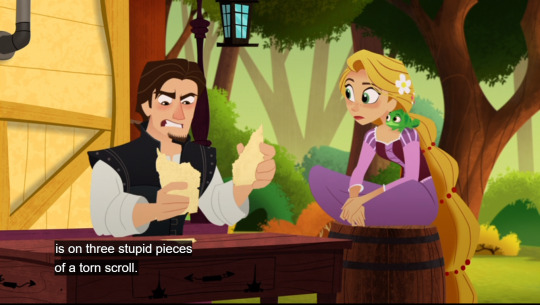
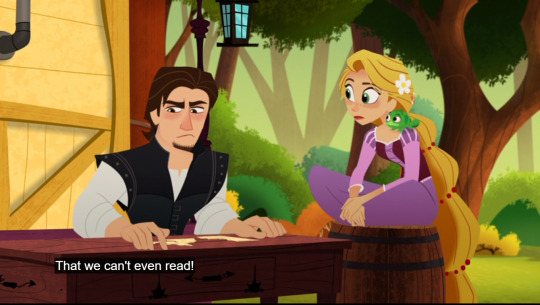
Once again, having the characters acknowledge their stupidity in meta dialogue doesn’t alleviate the fact that the audience is going to think them stupid.
Regardless of your personal feelings towards Varian or what he has done in the past that does not change the fact that he is literally the only character in the show thus far who can translate the scroll. The mains knew that before leaving and they knew from the get go that they were going to need the scroll piece which is why they took it from him.
Not bringing him along, not getting a translation key from him before leaving, nor even showing us a scene of Raps trying to ask him to translate the scroll for them before leaving and then having him refuse to do so, is a plot hole.
Timeline Hint...Sort Of...
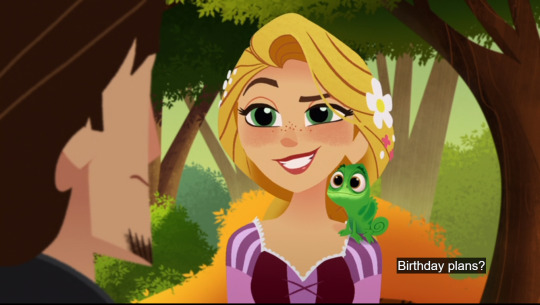

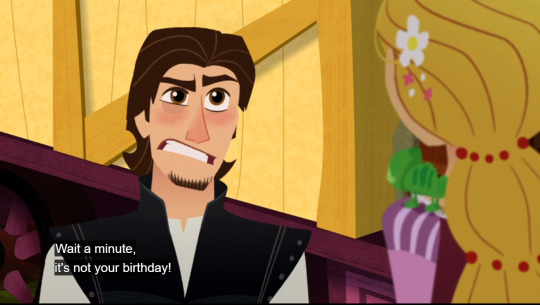
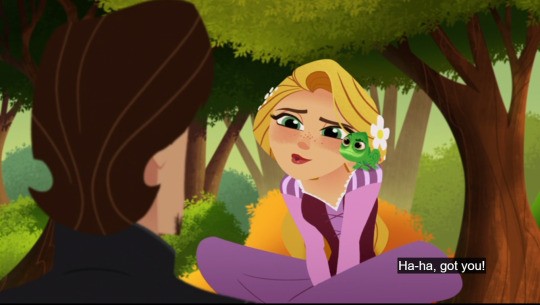
Rapunzel said last episode that it had been almost year since they left Corona, and it’s now close enough to her birthday again that Eugene could be tricked by it but not enough to actually be her birthday.
So...when are we again?
I’m going to guess 10 months after Secret of the Sun Drop? Maybe... It could also be 9 or 11 who knows... but I am still seeing fall like trees which is our only indication of a changing season in this show because the creators don’t understand climate apparently.
Maybe cause we’re now further north of Corona we see fall/winter leaves even into early spring?
Where Was This Rapunzel In Season 3?

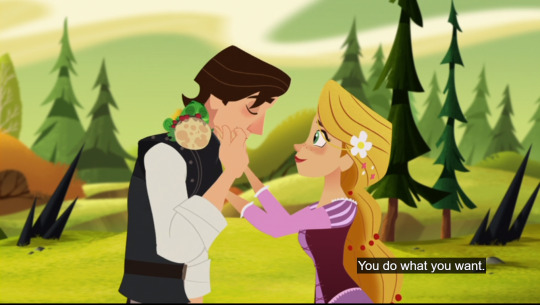
Rapunzel actually giving a crap about what Eugene wants is as rare as seeing a fawn in the woods. It happens, but most of the time you forget it's even there.
While come season three, Rapunzel will just shoot the poor deer dead.
Madame Canardist is a Wasted Character

I’ve already discussed at length the biggest problems with Madame Carnardist in my Vigor the Visionary and Curses reviews. So I won’t rehash those talking points here again. However what I spoke about were larger problems with the media industry and bigotry as a whole and not the specific impact the character has on the story. Which is next to none.
The crew went through all of this trouble to make a deleted character from the film relevant to the series’s plot, and even there they failed. Madame Canardist is nothing more than a translator for Vigor when Demantius isn’t around. The story doesn’t utilize her properly despite her connections to one of the more plot important characters.
What is her relationship to Demantius and Zhan Tiri? How did Vigor come into her care? Why is she the only person who understands him when Demantius isn’t in control? If Vigor is centuries old by this point than how old is she? What is her stake in all this and why does she bother with Rapunzel at all if she has nothing to gain from it? Why doesn’t she go along on this important quest through the maze seeing as how she is Vigor’s caretaker?
She’s not completely useless, but like with Lady Caine, Xavier, and Hector before her, she has far more potential than the series is willing to explore with her.
So Much For Caring About What Eugene Wants

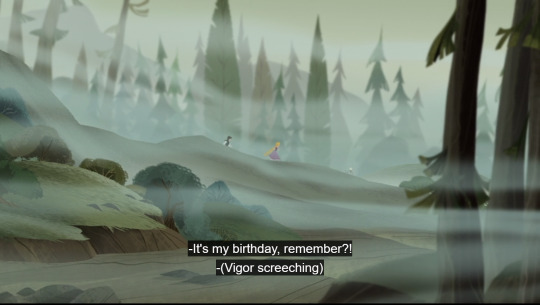
Welp that lasted all of five seconds.
Man, Rapunzel is a shit girlfriend.
The Pay Off Works, But It Then Serves No Purpose Afterwards


I don’t mind the idea of Demantius being the monkey. I mean it is one of the very few plot points in the show with proper foreshadowing and follow through. And yes, Demantius does accomplish one thing here, by helping Raps obtain the last scroll piece.
The problem is, nothing changes with this revelation.
No one’s perceptions or interactions with Demantius/Vigor are altered after this reveal. No one changes their plans, goals, or motivations afterwards. Things carry on more or less afterwards the same as if they had never met. The only thing of importance here is the scroll pecice and that’s only relevant in Cassandra's Revenge and is then forgotten about completely for the rest of the series.
What’s the point of having a plot twist if the status quo still remains?
If the information being revealed doesn’t alter the story then why keep it secret to begin with?
How Could You Research Them If You Never Found Them?

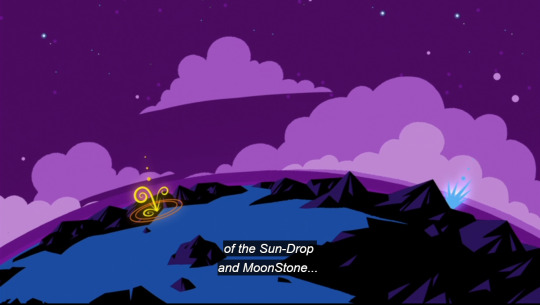

So did Demantius write the incantations or not?
He is the one who put them on the scroll, so it’s natural to conclude that he did create them, but he couldn’t have done that unless he had studied both the moonstone and sundrop to see the effects the two macguffins had to the spells.
Now according to this exposition dump, the sundrop and moonstone had been around for ages before Demantius and had become legends by his time. It is possible that someone else studied the two macguffins before him and came up with those incantations, but who?
The ancient people of the Dark Kingdom might have studied the moonstone since they were tasked with guarding it, but no one knew where the sundrop was until Gothel found it.
The audience needs to know this sort of information in order to understand the motivations driving the conflicts of the characters.
Imagine a Lord of the Rings trilogy that never bothered to say where the one ring of power came from or how it came into Gollum’s possession. You’d be left wondering why everyone was fighting over what amounts to an invisibility spell that once belonged to a small deformed hobbit who used to catch fish.
This Explanation Goes Nowhere

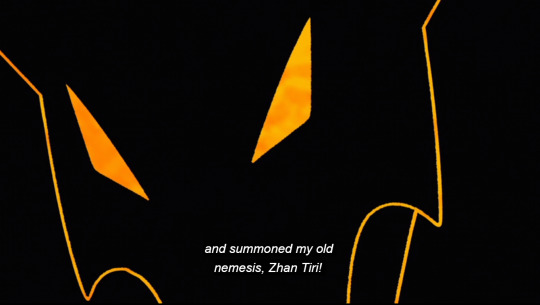
Why did the disciples betray Demantius? What did they gain from siding with Zhan Tiri? Why was Gothel with them? Did she betray everyone once she found the sundrop? What was Demantius and Zhan Tiri fighting over to begin with?
Don’t expect any of those questions to be answered. The series inexplicably makes a big deal over Gothel being connected to Zhan Tiri, but then never actually explains what that connection is, what they’re relationship dynamic was, nor how it connects back to Rapunzel’s and Cassandra’s current conflict.
That’s the real failing of the show’s lore and backstories. They don’t connect back to the current conflict. It’s just there.
In a well constructed show, Demantius would have been a parallel to Rapunzel who was also ‘betrayed’ by people she trusted. It would have been revealed that it was Demantius’ own actions that drove away his followers and caused them to side with Zhan Tiri. Thereby serving as a warning to Rapunzel herself and forcing her to realize in the end that in order to save everyone she’s have to apologize to those she hurt. We also would have gotten three betrayals instead of two since that’s more thematically impactful.
But this isn’t a well constructed show and the characters in it don’t ever evolve.
This Contradicts What We Find Out In Season 3
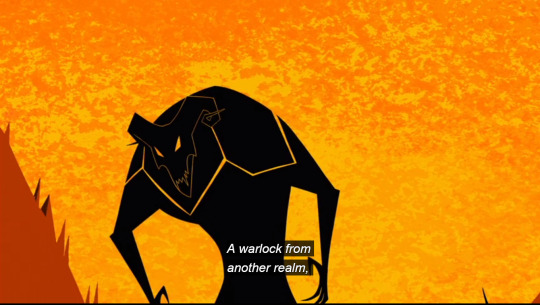
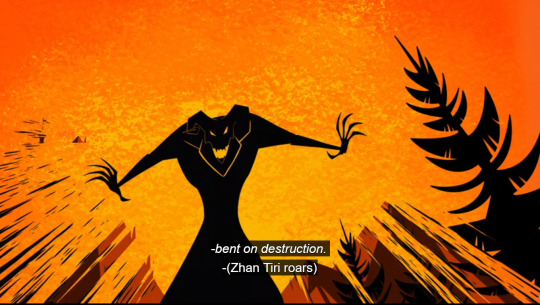
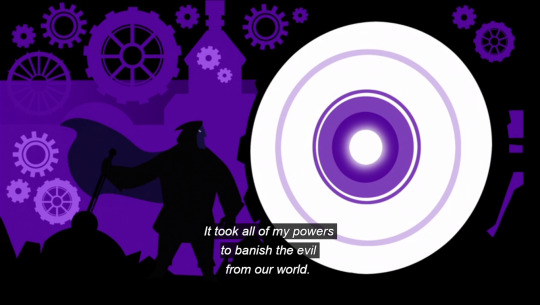
We find out in the last season that Zhan Tiri was originally from this world and that the only reason she was ‘bent on destruction’ was because of Demantius ticked her off somehow. She also had no magical powers of her own until after Demantius had banished her to that other realm where she was imprisoned.
Also Demantius didn’t use any powers. He just chucked her into a portal he had built without any warning or trail, with zero idea if it would kill her or not, all because she just stood there yelling at him. Like there wasn’t even any physical fighting, so it wasn’t a case of in defense either.
Demantius should have been revealed to be the real antagonist all along but that would require the showrunners to be actually clever for once and not misogynistic towards their female characters.
This Makes Zero Sense

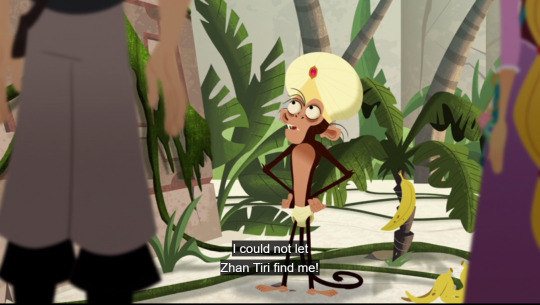
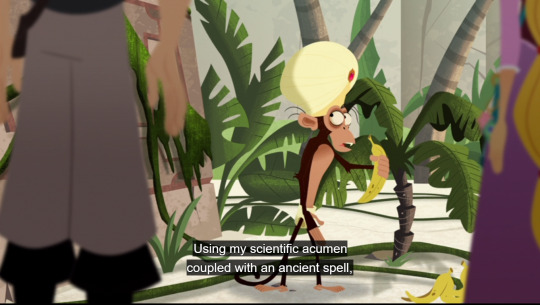
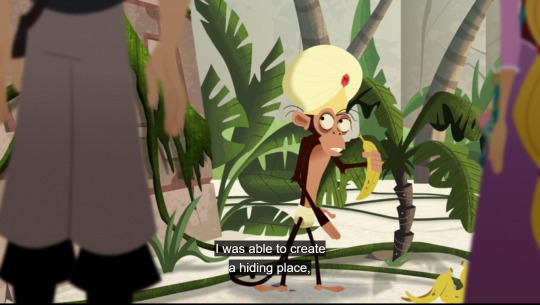
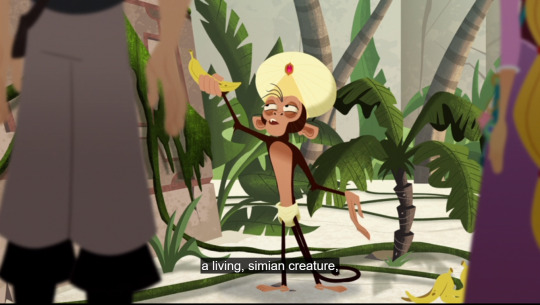
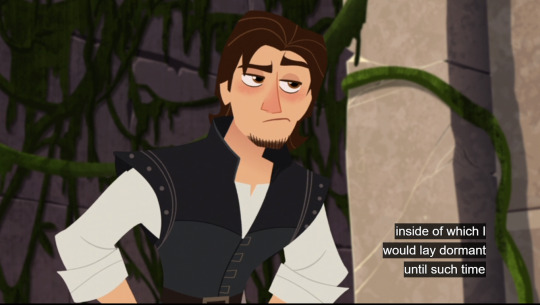
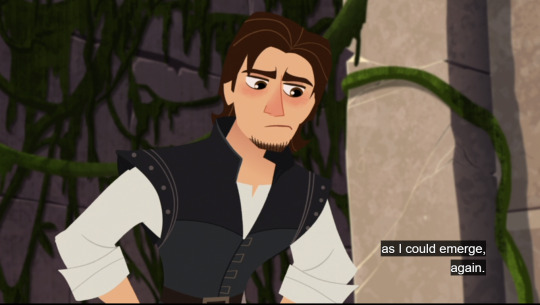
First off, when was Zhan Tiri ever looking for Demantius? She’s been too busy trying to escape from her prison and it’s been centuries. She has no reason to suspect that he’s still alive nor does she care. Zhan Tiri’s plans are not dependant upon whether or not Demantius still exists.
Secondly, how is the host body still alive after centuries? Why go with monkey when I’m sure there are actual human beings out there who would agree to living forever. Does the transfer actually destroy the mind? Cause if not you could have had an actual coherent host that could have helped out when Demantius was dormant.
And don't give me any guff about ‘ethics’ because this is the man who played judge, jury, and executioner to his supposed friend/possible lover and probably killed one of his disciples as Sugarbee’s spirit was trapped in his device.
Not the Best of Plans My Dude
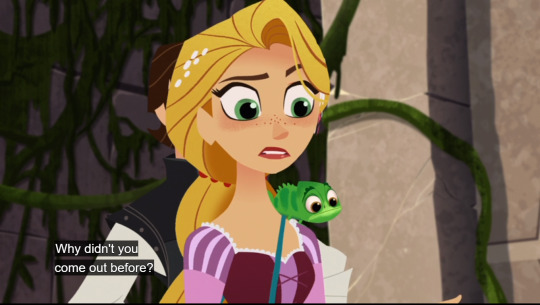
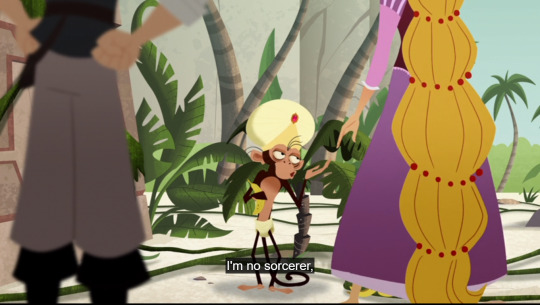

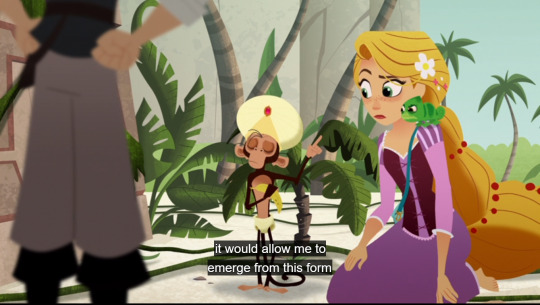

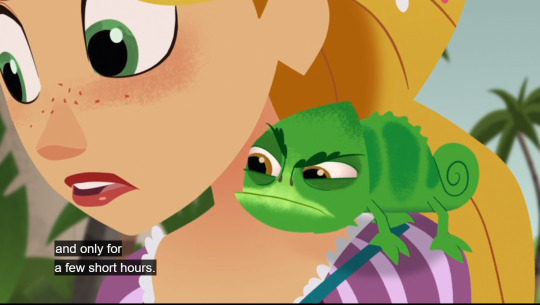

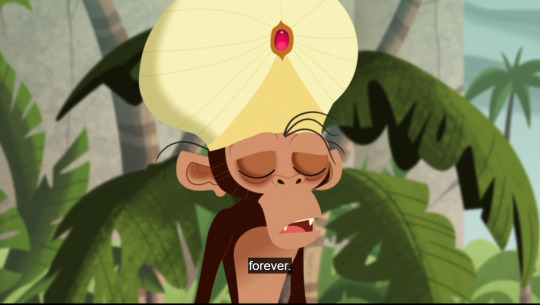
So Demantius is basically committing suicide here for no real reason.
Unless he was just already dying anyways when he made the transfer, then Demantius is drastically shortening his conscious life span. The monkey will live on, but he won’t.
So why? He had no way of knowing that the sundrop would become a person in the future, it’s completely coincidental that he met Rapunzel just at the right place and time to help her, and as stated above, Zhan Tiri was no longer a threat to him or the world since he imprisoned her and defeated his disciples.
Like what was his thought process here? “I just really, really want to be a monkey?”
Eugene Isn't Wrong

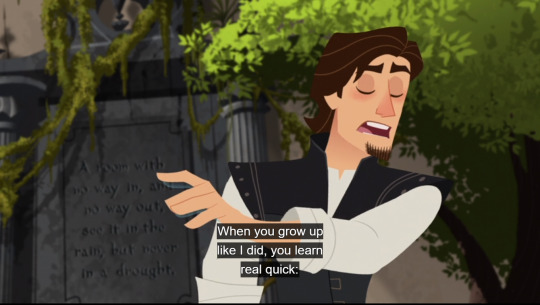


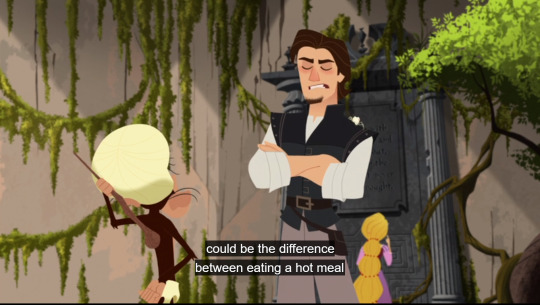
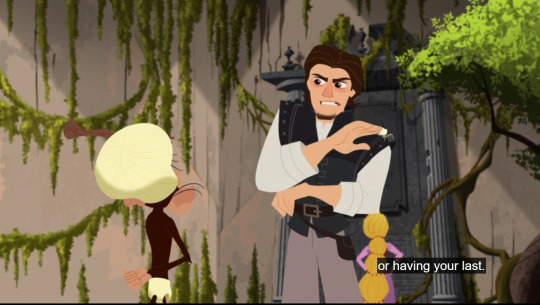
Look, I am a deeply religious person and I have faith in many things, but even I know that critical thought is necessary for basic survival and that scepticism is just plain common sense. Believing in something doesn’t mean shutting your brain off and never thinking for yourself.
Demantius has yet to give any reason for why Eugene and Rapunzel should trust him. Him saying ‘have faith’ repeatedly does nothing to instill confidence and in fact does the opposite. If you want to people to believe in you, especially in a dangerous situation that you dragged them into, then you need to earn that trust.
There’s a world of difference in assuming the best in people and being a fool, and Rapunzel is not the better person just because she blindly goes along with anything because she stubbornly wants to do whatever she wants and assumes she’s always right.
Eugene is Still Right
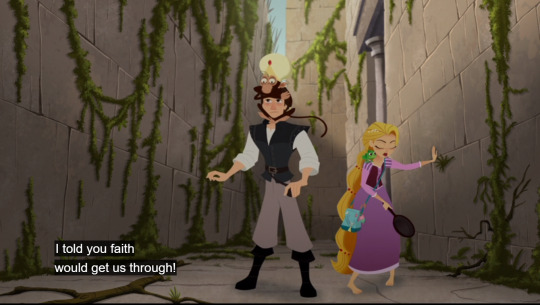
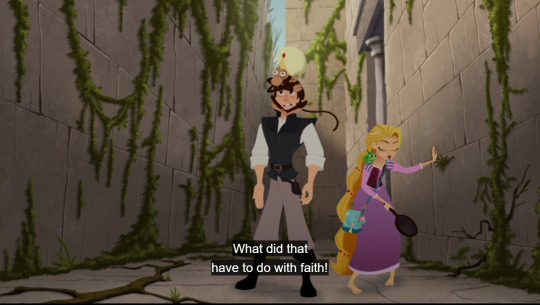
Is ‘Faith’ the new ‘Destiny’ now? Are we just assigning different meanings to random words in order to push the story’s narrative along?
This entire maze only involves solving puzzles, answering riddles, and a bit of running and climbing here and there. ‘Faith’ has absolutely nothing to do with it.
This theme doesn’t even work when you take into account the reveal that it’s Eugene who needs to have faith in Rapunzel. Because Rapunzel isn’t the only one doing these things and getting them through here.
In fact Demantius being here, and being the one who built the maze in the first place, kind of negates Rapunzel’s importance in this area. Secondly, Eugene is doing half the work anyways so it should be a message about having faith in each other. But they already have that so...yeah what’s the point of Demantius constantly bringing it up?
Why Are You Caring About Money While Stuck In a Death Trap?
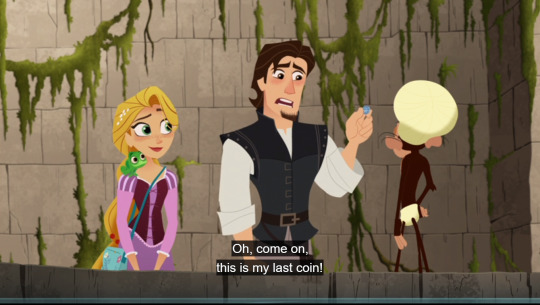
You’re rich now, Eugene. You’re the future prince consort and live in a palace. As soon as you get back to Corona or a place that recognizes Corona as a kingdom you’ll have plenty of money to spare. But you can’t do that if you’re dead inside a maze.

Moreover, Rapunzel still has money on her. She just threw two coins in to the well; one for her and one for Demantius. You two live together! You’ve been traveling inside a caravan together for over a year now and neither of you work. Ergo, you should logically be sharing your finances at this point in time. Especially since that is what you’ll be doing anyways once you’re married for real, as you’ll both be heads of state.
That’s Now How Faith Works
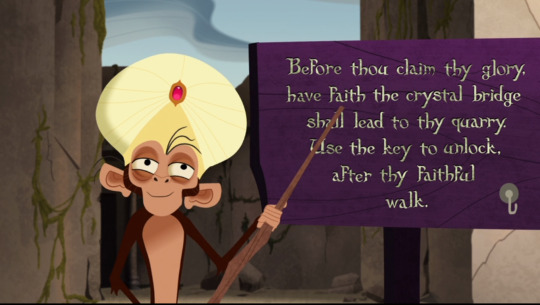

Faith is evidence for things unseen, or to put it more accurately the evidence for things that are unprovable. God, death, the future, creation, souls, the meaning of life, ect, are all concepts that can’t be proven nor disproven. No one upon this earth will ever know for certain what happens after death, how the universe was made, or if there is any intelligent life out there beyond ourselves.
People don’t like the unknowable.
Believe systems of all kinds, whether they be religious or not, exist to bring us comfort when face with the dread of such existential questions. Even if that belief system is agnosticism itself.
Gravity, weight, and basic physics however are all provable concepts that have been around since Ancient Greece, if not longer. Man has always known that if you drop something it falls, even if they didn’t have the math to back it. It’s just a fact of life.
‘Faith’ isn’t going to stop Eugene from falling. It’s not going to make the bridge more sturdy. It’s not going to magically make him as light as a feather. It won’t turn the acid below him into water. “Faith’ can’t literally give you wings and make you fly; that’s just a metaphor.
What Demantius is promoting here isn’t faith. What he’s asking Eugene to do is to blindly follow his orders without question.
This is especially jarring when you consider that Demantius is supposed to be a famous scientist. He should know very well the importance of critical thought and that having faith doesn’t mean shutting your brain off.
The Scroll is Such a Let Down

We’ve spent a season and a half finding the pieces for this thing and it won't actually be relevant until the halfway through season three. Mostly because the one person who can translate it isn’t here.
On top of that, it’s no longer important outside of one episode. It’s an example of the payoff not living up to its hype.
So This Is a Lie
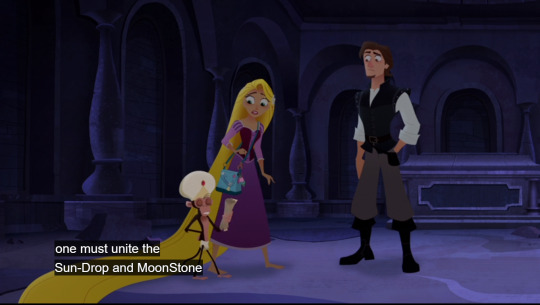
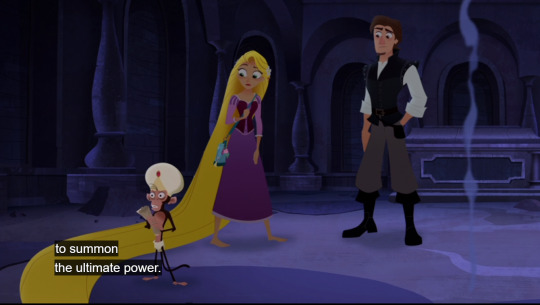
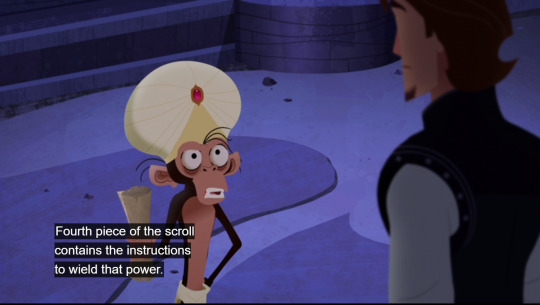
The scroll only contains four incantations on it, and one is on the back in invisible ink and not the fourth pecice itself. None of those incantations involve combining the moontsone and sundrop together. In fact, after using two of those incantations only once they’re never seen being used again for the rest of the series. Furthermore, once the moonstone and sundrop are combined they only allow the user to perform the healing and hurt incantations, which Rapunzel can do anyways without the moonstone.
Demantius wrote the dang scroll himself! He should very much know what is on it and what it does. This is yet another case of the writers not planning things ahead.
Being Good at Riddles Doesn’t Make You ‘Pure of Heart’
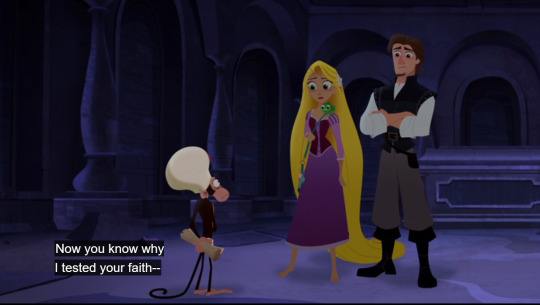
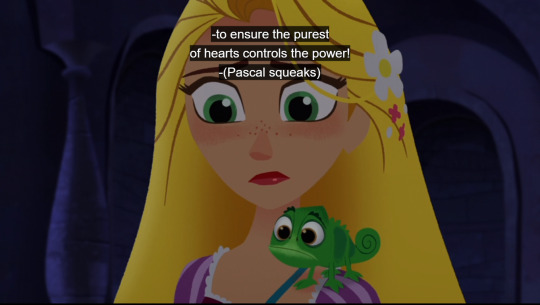
Being ‘pure of heart’ means that you are kind. One does not need ‘faith’ to be kind. Being kind is doing the right thing and helping others even if it doesn’t benefit you at all.
Not only does running through a maze not have anything to do with faith, it also has nothing to do with kindness.
The only thing it proves is that Rapunzel enjoys running through a maze, and will do so in addition to dragging others along with her regardless if those people want to do it or not.
That’s not being kind.
If anything Rapunzel has only proven thus far in the series that she is a very selfish person who shouldn’t be trusted with such grave responsibility.
But as already pointed out, Demantius doesn’t care about actual faith, kindness, or purity. He just wants blind obedience. He’s mistaken Rapunzel’s exuberant and stubborn nature for nativity; not realizing that her complancany is only because they both desire the same goal.
Had he asked Rapunzel to do something that she didn’t already want to do, she wouldn’t have been so ‘pure’ to his mind.
That Is a Very Valid Question

Eugene has a point. There’s no reason to go on this quest. In fact knowing about season three in hindsight, turning around now and not going to the Dark Kingdom would be the better option for everyone.
Cass couldn’t steal the moonstone. Zhan Tiri would never be freed. Corona will never be destroyed and the brotherhood never mind trapped. As for the black rocks they will just sit there impotently not doing anything.
Even freeing Quirin, not that Rapunzel cares, only requires the hurt incantation, which she already has.
The only problem is that Cassandra has ZT trapped in her mind but without the moonstone that has no consequences outside of Cass hearing a annoying voice in her head that she is perfectly capable of ignoring. And even that wouldn’t have happen if they had turned around after the Great Tree.
SHOW DON'T TELL
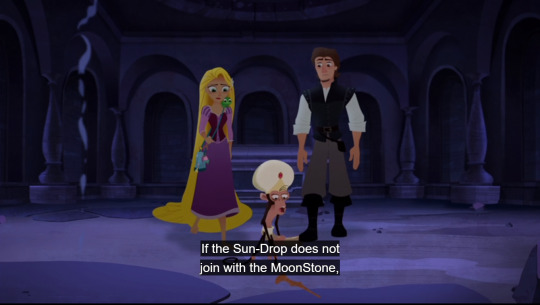
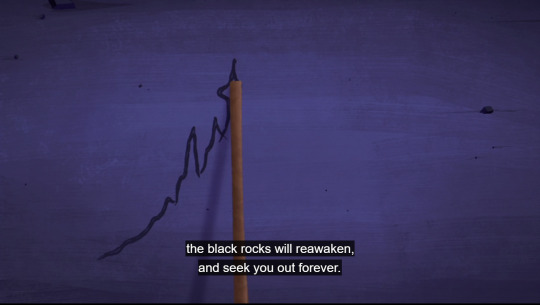
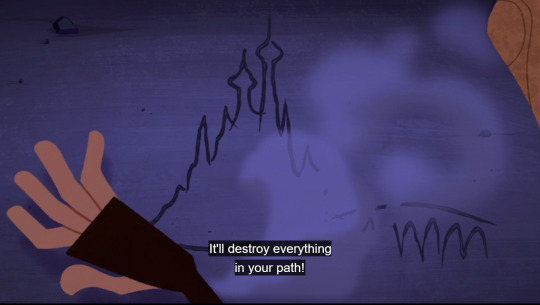
Nothing in the show back up what Demantius is saying here. We haven’t seen the rocks being active since season one. Even when Rapunzel was lollygagging around or going off the path.
When they do become active again in the next episode it’s to help her, and after that in season three it’s all Cassandra’s doing.
Also in season three Rapunzel is able to rebuild Old Corona around the rocks with little problem even though she didn’t reunite with the moonstone.
In a Competent Show This Would Be Foreshadowing. This Is Not a Competent Show.
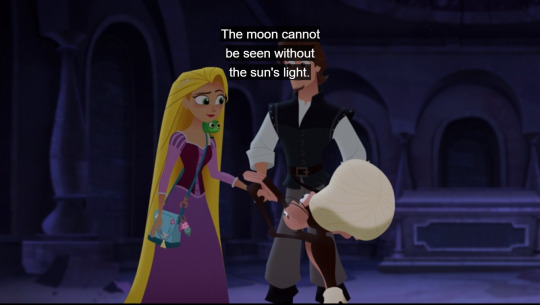
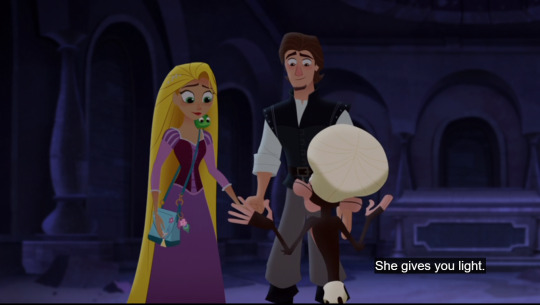
I genuinely thought this was hinting at Moon Eugene, when I first saw this. Now couple that with the talk of ‘three betrayals’ earlier and I thought Eugene would be the final ‘betrayal’ and that a true love's kiss, after Rapunzel had apologized to him, is what would reunite the two powers and save the day.
I’m not going to fault the show for not living up to my expectations and predictions, but I will fault the series for failing to utilize Eugene properly and not working him into the main conflict. He’s the duel protagonist of the franchise. He should have just as much weight in the narrative the same as Rapunzel has.
Oh How I Hate Where This Arc Goes

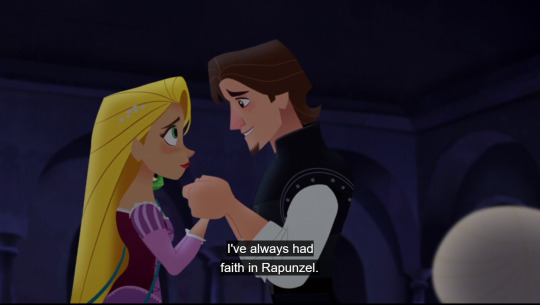
What the show does wind up doing to Eugene however, is incredibly stupid and frustrating.
Remember how I said that ‘faith’ in this show is just blind obedience?
Yeaaaahhh....
That’s what Eugene takes from all of this. Not that he should support and believe in his partner, something that he already was doing by the way, but that he needs to be a doormat to her and her whims.
Like with Rapunzel yelling at Hook Hand in Brother’s Hook, this is the point where Eugene’s character starts to break. You just wouldn’t know it until after watching season three.
This Is Such a Lazy Cop-Out
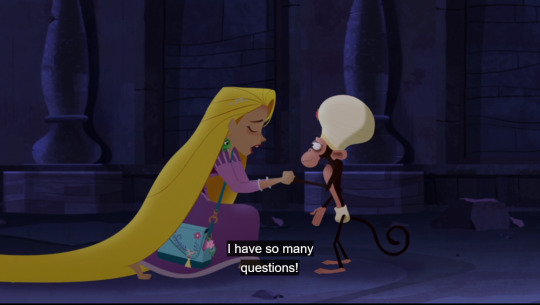
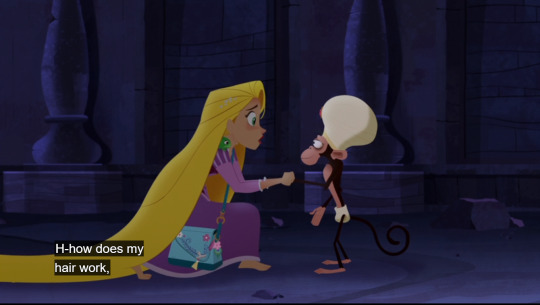
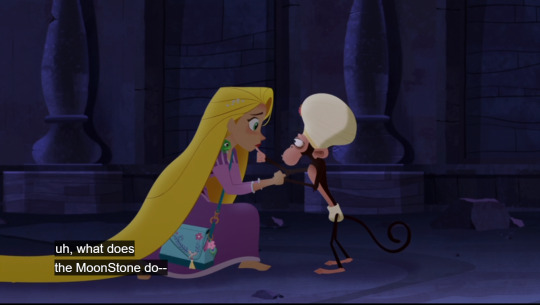
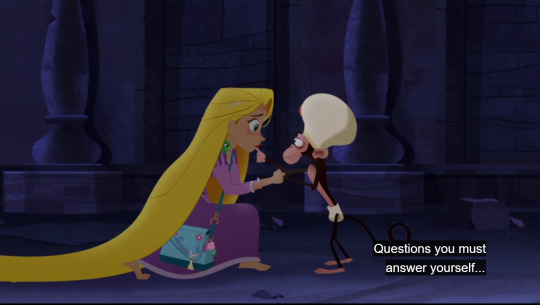
Like the audience has these questions too. Neither us nor Rapunzel will ever have these questions answered. You just backed out of committing to any real answers because you didn’t have your story planned out like you should have.
Why Does Everyone Act Like There’s a Prophecy When There Isn’t Any Actual Prophecy?

Once again, Demantius had no way of knowing that the sundrop would become a person. No one did. There’s no prophecy and there’s zero explanation for his psychic abilities, which are inconsistent at best. In fact I don't think he does have such powers, otherwise he’d be more helpful inside the maze. I think those are reserved for Vigor only and we don’t know where he got them or if he even is a ‘real’ psychic.
Tangled the Series wants to act like it’s running on a predestination plot. That events must occur and will occur regardless of what actions you take to prevent it. Now ignoring how that causes problems with the characters’ agency for a moment; you can not have any predestination if there’s no actual destiny.
Chosen one plots often have prophecies for a reason. Predestination is there to evoke either tragedy that can’t be prevented or present consequences for if/when the main hero doesn’t follow along. Either way it’s there to establish conflict.
Everyone in TTS acts like there is a conflict when said conflict hasn’t actually been established!
This is writing 101. You need conflict. You need to establish shit. You can’t just pretend that a conflict exists where it doesn’t. ‘Fake till you make it’ doesn’t work in long term storytelling and television animation. It has to be pre-planned.
Also The Timeline Doesn’t Match

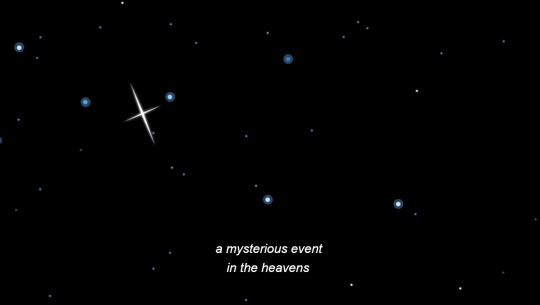


Demantius said that it was a millenia when the sundrop and moonstone fell.He also just said he’s been waiting for a millenia to ‘meet the sundrop’. Yet Demantius acted like the sundrop and the moonstone were already legends by the time he started to search for them. That means they had to be around longer than he has. It also brings us back to the first question of who wrote the incantations if he and Zhan Tiri never found them?
Believing In Someone Does Not Mean Shoving All the Work Onto Their Shoulders
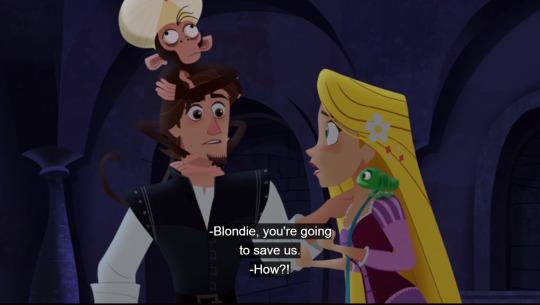
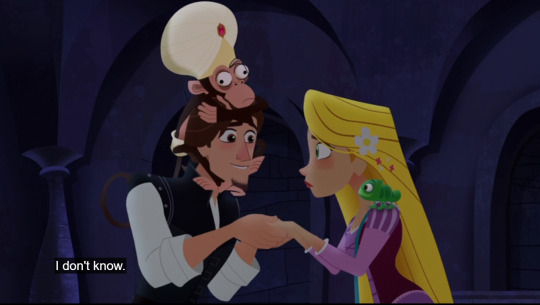


You’re supposed to be in this together. Couples should work as a team. Both of your lives depend upon getting out of here so you should both be coming up with ideas and working together.
Not only does this miss the entire point of what ‘believing in your spouse’ actually means, it’s also incredibly unfair to both of these characters. It’s unfair to Rapunzel for put so much pressure and unrealistic expectations onto her and to have her be the person to carry both of them through when Eugene is perfectly capable of physically doing things. It’s also unfair to shove Eugene to the side and make him a useless character all of a sudden.
Rapunzel Does Nothing To Earn Such Blind Devotion

Rapunzel’s magical hair has nothing to do with Rapunzel as a person. It’s an entity separate from her being. Literally. The hair can move of its own accord as shown here and it’s possible to physically separate Rapunzel from her powers as seen in the finale.
Believing in Rapunzel should be about believing in who she is as a human being, about her individual character. It should not be because she has magic glowing hair.
Not only is this a betrayal of Rapunzel and Eugene’s relationship and why they came to love one another in the first place, but it’s also a betrayal of Rapunzel’s growth as a character. It’s not only Eugene who blindly kisses her ass after this point, it’s everyone, even though she gives them little reason too.
This the Last We’ll See of Vigor and Madame Canardist
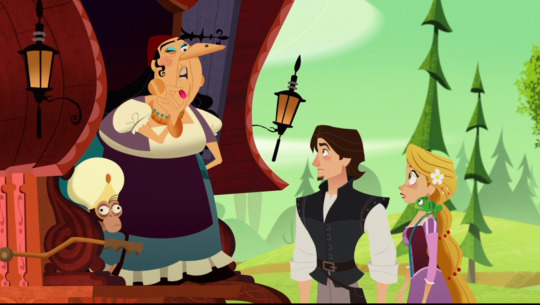
Three episodes spent establishing these characters and now they’re just gone for no reason. They’re never seen of nor mentioned again beyond a single meta joke. Despite the main conflict revolving around Demantius and them both having the closest connection to that character.
This Is Bad Foreshadowing, But At Least It’s Actual Foreshadowing
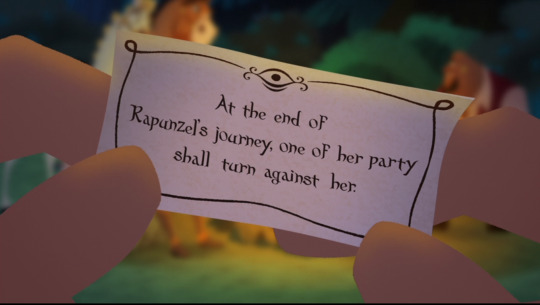

Up till now any ‘foreshadowing’ we got for Cass’s villain arc has been confined to poorly thought out background images; the painting of the moon, the broken mirror in Gothel’s tower, and I won’t even dignify Chris’s bullshit about her handmaiden dress being blue.
Not to mention all of that was only in season one. Outside of her conversation with Eugene about their parents, way back in Cassandra vs. Eugene, we haven’t had any real foreshadowing until we hit the Great Tree.
Since the Great Tree we’ve only had a couple of bitch fights with Raps, which I personally don't consider real foreshadowing since no ill will was attached to those, and her glaring angrily at Rapunzel after escaping the shell house.
In light of that, this scene is at least genuine foreshadowing, it’s just poorly done foreshadowing.
While the other attempts at foreshadowing were too subtle, this one is too obvious. It gives the game away too early because there’s no other viable options within Rapunzel’s group. Adira comes closest and she’s not actually here and not really considered a friend by Rapunzel herself.
So what winds up happening is that Cass’s arc feels rushed despite being planned since the beginning.
Conclusion
I spent three days fighting tumblr to get this review posted! Appreciate it!
As for the episode itself, it’s fun to watch in isolation, but it’s such a let down knowing what’s to come from it all.
59 notes
·
View notes
Note
Hello there! Could you maybe put together small SW novels recommendation list? You reference books often and I assume you can suggest a few good ones that shed light/give more insight into the Jedi culture. Thank you for your blog and have a good day 💗
Thank you! I hope you have a good day too.
I actually haven’t read that many Star Wars books, all things considered - there are a lot, and I’ve barely scratched the surface of the prequel era stuff, let alone the rest of the franchise. I only recently started getting into the books, and there’s probably a lot more really good ones out there that I just haven’t had the chance to get to yet.
What I could do is go through what I have read and give my opinions on those. So far, in no particular order, I’ve read:
- The novelizations for the prequels and some of the original novelizations for the OT. More on my thoughts on those here (and specifically for the ROTS novelization here), but in summary: TPM novelization is a bit weak, AOTC novelization is decent and really helped sell the romance to me in a way the film fell flat for me, ROTS novelization is nothing short of phenomenal, ROTJ novelization is also pretty good, I don’t remember the ESB novelization enough to say anything on it, and I never read the ANH (or technically just Star Wars) novelization. I’d say they’re worth checking out at least once.
- Shatterpoint. I really like this one, it deals a lot with Mace struggling with the dark side, and it captures the idea of falling to the dark side as something rooted in defeatism, which really resonates with my interpretation. There’s quite a bit of discussion of Jedi philosophy and why they do and believe the things they do (or at least how Mace Windu sees it) - I’ve cited it before in my meta because I think it lays out pretty well why they resist the dark side. It also deals a lot with the costs of war - especially psychologically. There’s also a decent element of Jedi as family through the father-daughter relationship of Mace and Depa. On top of all of that, it’s very well written (same author as the ROTS novelization). I strongly recommend this one, though be warned that it is a very heavy, brutal book - oh, it’s not completely bleak, and it has it’s moments of humor, but it is not a happy story. It ends in victory, both in the immediate situation, and with Mace coming to terms with some of what he’d been struggling with, but I wouldn’t call it a happy ending, more that…well, as Mace says, he’s the last one standing.
- Yoda: Dark Rendezvous. I read this one most recently, and I made a long post on why I absolutely loved it. It’s not perfect but I think it’s the best portrayal of the Jedi in the books that I’ve come across so far - this book really goes hard on the “Jedi as family” idea, which I love, and there are really good conversations on (and inspiring examples of resisting) the dark side, and working through but not giving into grief. Everyone should read this book, it shows the Jedi as an inspiring people with so much tenacity and compassion, doing their best. And it eviscerates every bit of nonsense about the Jedi (and especially Yoda) being “emotionless” or “loveless”- it’s full of amazing passages that are absolutely perfect responses to these notions, direct refutations of them even (as well as refutations about the idea of the dark side having any kind of merit at all) because they get slung around in the story by a lot of the characters. If I could only pick one Star Wars book to suggest someone read, it would be this one, absolutely.
- Kenobi. Do you like Westerns and a sad Obi-Wan with a chronic hero syndrome that doesn’t help him with the whole ‘staying under the radar’ thing? If yes, you will probably like this book. It doesn’t really get much into Jedi culture, since…well, they’re dead, and most of the book is written from an outside perspective, not Obi-Wan’s. I think that was a good choice, because while he’s understandably going to be very sad during this time (it takes place during his very early days on Tatooine), constant exposure to that, in my opinion, would overdo it and wear out the audience. So the outside perspective of how sad and weird he is, where the characters don’t understand the context behind his behavior, but the audience does, works really well. I have some issues with it - for instance, while it’s kind of hilarious how much everyone wants to jump his bones in this book, I do wish that they’d kept the chemistry between Obi-Wan and Annileen strictly platonic (and the language around romance in this book rubs me the wrong way). And how people find out his last name is a bit contrived. But it’s a decent read that I’d recommend.
- Jedi Apprentice (series). I’d recommend this with the caveat that you have to go into it keeping in mind that it’s written for younger readers. Which absolutely does NOT mean it’s all fluff and sunshine and rainbows, very far from it (I call this series “Obi-Wan Kenobi’s Collection of Childhood Trauma” for some very good reasons, and the fact that he tries to sacrifice himself to suicide-bomb a door open with the slave collar wrapped around his neck before he even gets taken on as a padawan is just one of them), but there’s a lot of stuff that…doesn’t feel like it was explored fully to an adult reader’s satisfaction. It has a lot of the usual kind of fridge logic that often comes into play with kids’ media, and while it was written to be favorable towards the Jedi, that fridge stuff gets taken by fandom as reasons to criticize the Jedi quite often. More on that here.
- Cloak of Deception. This one’s…okay? It does spend quite a bit of time with the Jedi, but it feels pretty surface level. Luceno’s strength is in the fantasy space politics; for whatever reason his character interactions always fall flat for me, though I’m not sure if I can articulate why they’re so unsatisfying to me outside of a handful of good moments. But if you’re looking for a look into the politics leading up to TPM (or at least, Legends take on it), this is (one of) the books to look at. I say one of because I actually read Darth Plagueis first, and there is a bit of overlap.
- The Approaching Storm. This is the lead-in book to AOTC. It does a decent job with a look at the Jedi, I think, with a few snags (Barriss straight-up heals brain damage/mental illness to the point of complete personality changes, which seems way outside Jedi abilities to me, and there’s a bit of “maybe we shouldn’t take people from their families” angle instead of the Jedi as family angle). Also for some reason it refers to Barriss and Luminara as humans. And while the book tells us a lot about how important it is that the Jedi negotiate this conflict, most of their actual obstacles are getting places, with the negotiation itself getting glossed over. But it was a decent read, I think.
- Labyrinth of Evil. This is another Luceno book, this time for leading up to ROTS. The character interactions worked a little better here - or at least they had more of their moments - Anakin basically going “Marriage what marriage I don’t see a marriage” in front of Obi-Wan was pretty damn funny…and everyone knows the “infinite sadness” line that follows off of that. I’ll be curious as to what the current continuity gives us for what set off the invasion of Coruscant, because this (as part of Legends) gave us a pretty good reason for it. I’d recommend it, again, for the examination of the political situation, and there’s some decent action in here too. There’s a few insights into the Jedi but it’s hit or miss whether I agree with them, and they’re not the focus.
- Darth Plagueis. This one’s probably the best of Luceno’s books (that I’ve read), but it’s not Jedi-friendly. Most of that’s because, well…it’s from the Sith’s perspective, so they’re not going to be very pro-Jedi. I’m mostly okay with that because a lot of their criticism of the Jedi is very clearly coming from an obviously bad faith position (”the Jedi let the Republic decay” the Sith say as they devour a man’s heart and talk about how the Sith need to make all the problems of the Republic worse), although there’s one scene at the end that I really don’t like because it appears to really claim that the Jedi would’ve told Anakin to never talk about his mother, which doesn’t match up with, well, AOTC, for one thing, or just my impression of them in general. But what this book does do well is a look at how the Sith influenced the political situation, and a lot of midichlorian lore (seriously, this book feels like a middle finger to prequel hate - “oh you thought the fantasy space politics were boring? You thought midichlorians were stupid? Here’s why you’re wrong”). Luceno’s way of doing character interactions actually serves this book really well, because the Sith are able to be written as the focus characters without making them sympathetic in the least. If you’re looking to get invested in characters, probably not the book for you, but if you’re looking for fantasy space politics, it’s pretty good.
- Rogue Planet. This one has a good interpretation of the Jedi, I think, though you do have to contend with the “written before AOTC” issue of authors not realizing that Jedi weren’t supposed to get married and have children. But I liked the look at how they handled discipline - Anakin gets in trouble, and he’s brought before the Council, and the whole process is about questioning him to get him to realize and admit what he did wrong, not punishment. They then make the decision to redirect his energy into something productive by sending him and Obi-Wan on a mission. Also, Anakin sees a Jedi therapist at the end of this book, so it’s a good one to throw back at anyone who claims that the Jedi never helped him or that the Jedi don’t do therapy. But…plot-wise…it’s a little weak, mostly in that not much is resolved because it’s mostly setting up for stuff that won’t pay off until much, much further down the line (as in, whenever the Yuuzhan-Vong show up). The ship-growing thing was cool though.
- Wild Space. If you’re looking for a ridiculously dramatic Obi-Wan whump fic that’s one step away from sticking Anakin, Obi-Wan, Padmé, and Bail in a foursome, this is the book for you. If you’re looking for things like accurate characterization, an interpretation of the Jedi consistent with the films, believable interpersonal communication, or an actual plot…you will be sorely disappointed by this book.
- Clone Wars Gambit: Stealth. This is the sequel to Wild Space. It has a second part, Clone Wars Gambit: Siege, which I have not been able to bring myself to read, which probably tells you all you need to know about my thoughts on the first one, though you can read more about them here. In short, I strongly do not recommend this book at all, and find it to be pretty terrible characterization (even though it’s played for sympathy) of the Jedi and especially Obi-Wan. Wild Space at least has absurdity going for it. Stealth does not.
And that’s it! That’s all I’ve read so far. I’m sure not everyone will agree with my opinions, but in terms of my personal recommendations/non-recommendations, this is what I have.
#book recommendations#or not recommendations as the case may be#discussion#jedi#on jedi culture#Anonymous
66 notes
·
View notes
Photo
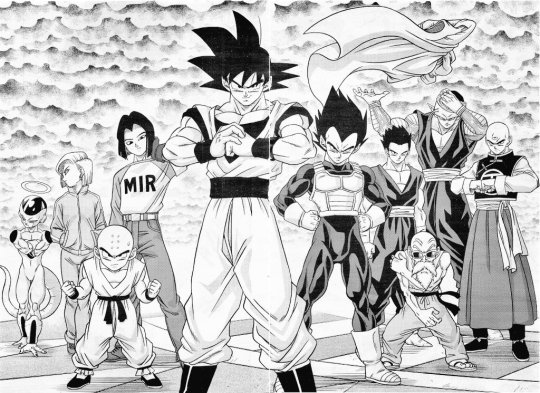
Dragon Ball Super and the Future
by Bunnypwn Gold
I am a huge fan of Dragon Ball, as I have stated here before and as I have written about in the past. My love and knowledge of this franchise is deep, and I will always be ready to enjoy what it has in store and wrestle with the ideas in it. And right now, it’s a great time to be a fan, because Dragon Ball Super is going strong. The anime has come to a conclusion and/or could come back in the future, and the manga is approaching the climax of its newest story, the Galactic Patrol Prisoner Saga. It’s amazing for a lot of reasons that I’ll discuss as I respond to this article by Kofi Outlaw, which praises the saga for going back to DBZ style storytelling as a “course correction.” While I agree with several points in this article, I also disagree with the basic premise and argue that the author is only saying these things about the saga because he has not been paying attention to how consistently better the manga has been than the anime of Super. I am using this response to organize my thoughts on how Super has gone so far, the divide between the anime and manga version of events, and the future of the series as a whole, not as a pro or anti stance against Kofi or his article, to be clear.
At the beginning, Kofi criticizes Super for having low stakes and focusing on making Goku and Vegeta the sole focus, increasing their power levels dramatically and leaving other characters to languish. He also said that there were a lot of gimmick fights. Overall, the story structure had changed to reflect this change in character focus and the villains were weak and unmemorable. This new arc, featuring fan-favorite villain Planet-Eater Moro and a range of great battles with his bandits for the Z Fighters to show their stuff, is a return to the DBZ structure, and it features all the brutality and high stakes of the old days. Best of all, it lays the foundations for a new future focusing on other characters.
I have to say, I agree with much of this. The focus on Goku and Vegeta as “Gods” and their super-special Saiyan-ness in the meta canon is really annoying to me. Elements of this were seen in DBZ, as the humans and Piccolo stop trying to catch up to the Saiyans, and it was all GT was about, making that series a big disappointment for me. The first three stories of the Super era are notably low stakes, as well, and I would have liked a little more tension. There could have been more focus on other characters and a larger cast in general, and that certainly would have been enjoyable. And to finish it out, I am very excited for what the Moro story means for the future. The whole thing has a “last chance to shine” feel for the old guard of characters we’ve known and loved for years, Goku is probably going to master Ultra Instinct and thus complete his journey as a martial artist, and it still opens up a lot more about the history and lore of the series to explore in the future.
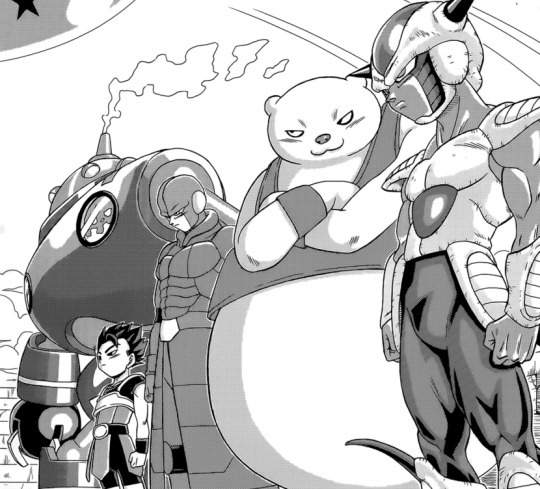
Beyond that, I have a lot to disagree with. For starters, if you look at the Tournament of Destroyers and the Tournament of Power and just see a bunch of “gimmicky fights” and no stakes, you’re missing the point. I always loved the tournament stories in Dragon Ball, and both of these Super tournaments deliver on that joy. The manga had a lot of important differences with the anime in how these tournaments went, too. Before the Tournament of Destroyers, the manga went through a condensed version of the Battle of Gods events, only offering one extension in the opening to give an actual benchmark on Goku’s strength so we know where we’re starting as a series, an important gift the anime and movie fail to deliver. It then time skips past the Resurrection ‘F’ story, which I think is sad, but ultimately serves the manga’s purposes. After Goku got his God form, the next thing we see, before the Tournament, is Goku training with a new master, showing that he’s back on the path to martial arts excellence. By skipping the Golden Frieza fight, the manga passed on a story that only shows off how cool Super Saiyan Blue looks (a term, by the way, the manga invented because it’s better); outside of showing off this new form, the Golden Frieza story adds nothing. As Goku and Vegeta enter the Tournament of Destroyers, they build a team entirely focused on power, and lose one of their strongest members because of a test of intelligence. To further drive home the point, Goku’s final battle with Hit ends with him realizing that his strength allows him to outmaneuver an innovative and amazing fighting technique, Time Skip. He then forfeits the match so he can have a real fight with Hit later, where Hit can try to kill Goku and has time to train beforehand, which sounds a lot like a DBZ style story. It’s the first step in Goku relearning that technique matters more than power. In the manga, they also gave more love to Piccolo. In the anime, they had him be effectively useless, barely able to fight Frost, a Frieza parallel. The manga had Piccolo fight evenly with Frost, who later shows that he’s almost an equal with Super Saiyan Goku; Piccolo lost because of poison, not because he “could never hope to beat a strong person.” It’s not as cool as it could have been, but it’s more than Piccolo ever got in the anime.
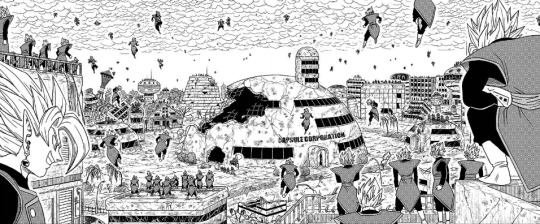
Now, I have to vehemently disagree that Zamasu was a weak, forgettable villain who existed solely as a gimmick. The Zamasu story carefully builds and delivers on the many themes of the franchise that I identify as atheist. Throughout the series, Toriyama repeatedly introduced gods of varying kinds and levels of divinity for the sole purpose of tearing down the illusion of their importance and special qualities. Gods in this world are a verifiable fact, and not only are they just people with a particular job, but every time Goku and Vegeta meet a god, they treat them like anyone else and show them no special respect or deference. Goku and Vegeta are the best exemplars in the series of treating deities like normal people, something the series itself does regularly. It’s one of my favorite parts of the series, as an atheist myself.
So, here we have Zamasu, a deity who believes that he’s uniquely capable and qualified to rule all of existence and that mortals aren’t worthy of life. In the Bible, on more than one occasion, God decided to wash the world clean of humans because they had become too sinful; similar stories exist in other religions and cultures. In this case, Zamasu is motivated by intense and literal hatred of mortals, who he sees as not simply having “become too sinful,” but fundamentally incapable of being anything else. He extends this hatred to other gods who want mortals to exist and do as they please. His rise in Future Trunks’s time to be the almost-almighty God with a Capital G is the antithesis of what the series has said about gods and divinity on every level, and that’s exactly why he’s such an amazing villain. He also checks a lot of other boxes. He uses the power of a mortal who made himself into a god, Goku, to kill the gods and overpower the mortals. He also relies on a mortal, Trunks, to develop his power and another, Dabura, to create the opening he needed to start his plan. In working to bring the downfall of all mortals, Zamasu in effect worships at the altar of mortals and relies on their miracles to succeed, just as Goku has trained with several deities on his path to success.
Trunks is also notable, because growing up, Trunks didn’t have any gods to look to like Goku did. The first “god” in Trunks’s life was Goku, as both his mother and teacher would talk about Goku as their main inspiration for hope. Goku was made into a mythical figure that could have fixed everything, and that’s exactly what Trunks used time travel for, both times he employed the strategy. That’s why Zamasu taking Goku’s body was so impactful, because “hope” came to kill him. Goku’s ultimate failure to defeat Zamasu also tears down the idea of Goku’s “divinity” in the same way as other gods were taken down a notch. This results in Goku calling on Zeno for help. The development of Goku and Zeno’s relationship is interesting and important in setting up the conflict of this story. They become friends because Goku is the only person who treats Zeno like he’s not special, which seems to confirm that Goku’s relationship to divinity is proper. At the same time, Goku doesn’t like Zeno, because he knows Zeno is just a bored shut-in and likely doesn’t understand Zeno’s role. And really, Zeno doesn’t have a role like the Gods of Destruction and the Supreme Kais. He’s in charge because he’s the most powerful and can destroy all of existence with a thought. That’s exactly what Zeno decides to do when he sees Zamasu and the multiverse he had been ignoring, getting rid of everything because he didn’t like how it turned out. Not unlike Zamasu with mortals; in effect, Zeno is the thing that Zamasu wanted to become, and that story ends with his vision of reality being carried out. It was the ingenuity of mortal time travel that made some form of happy ending, because like in every other Dragon Ball story, you can’t rely on the gods for most anything. So yeah, Zamasu is an amazing villain and his saga was brilliant. My main criticism of the manga version was that the setup was rushed, so the death of Future Bulma happened off panel and the death of the rest of the mortals in existence was breezed by. Plenty of brutality and high stakes, if you ask me, though yes, I wanted to see it with my own eyes more.

Then we get into the Tournament of Power, a great tournament story that really drives home the point of the god-centric Super run. The Tournament of Power, if you didn’t guess, isn’t about power. It’s about teamwork, strategy, and skill. In the manga, this is made absolutely clear. The downfall of everyone in the tournament is that they rejected this basic premise or were wiped out by someone who would later meet their downfall for rejecting this basic premise, setting up their incorrect view to be knocked down in the end. Goku brought Frieza onto Team Universe 7 because he feared they would need his raw power, ignoring the possibility they bring in Yamcha or Chaozu for a friendly face that works well with their team. Hit reappears and shows that he has gotten way stronger. However, he loses to Jiren, Goku’s main opponent, in the opening of the tournament because he was relying on that raw power and abdicated the potential of his famed fighting technique. Multiple times, stronger and more arrogant solo fighters regard those fighting as a team as being weak and no threat. The main exception to those relying on teamwork being weak is Gohan, who was very strong and wanted to work as a team. In the anime, Gohan was made inferior to Frieza and ultimately lost trying to beat a lesser opponent. In the manga, Gohan, in his Potential Unleashed state and not as a Super Saiyan of any form, fought evenly with Hybrid Super Saiyan Kefla, who I suspect was the second strongest person on the field, and double-KO’d with her. In the fight, it’s implied that Gohan could go Super Saiyan while using his Potential Unleashed state, but chose not to so he didn’t have to rely on that kind of gimmicky power. It’s incredibly badass and satisfying.
As the fight with Jiren nears its climax, Goku uses a strategy that could kill him in an attempt to overpower the foe who’s stronger than any God of Destruction. This prompts Roshi to step in and admonish Goku with the single most important line in Super. When Goku says he needs more power to beat Jiren, Roshi says, “Hmph…Power, y’say? Plain old fighting strength? Who the heck taught you that? Vegeta? Frieza?” This is a great moment, because not only does it push Goku to go for Ultra Instinct and focus on bettering himself as a martial artist once again, but it pushes back on the worst lessons fans take from the franchise. Goku isn’t cool because of his strength, and he’s not so strong because he can transform. It’s all about that martial artist’s journey, baby. Goku grew up constantly learning new ways to become a better martial artist than he was the previous day, and it was pure passion driving him; he got to where he is because he took every opportunity to better himself, with his transformations just a convenient way for the story to keep upping the stakes. Jiren is the pursuit of raw power incarnate, with indifference and constant dissatisfaction his reward, and all he wants is his dead master to tell him he’s finally a good fighter. He’s everything Goku was becoming, and Goku overcame him by returning to his roots. He was able to fight Jiren evenly with a technique that anyone, theoretically, could learn if they reached the same heights of martial arts mastery, as proven when Roshi uses an imperfect form of Ultra Instinct to trade blows with Jiren. The manga anchors this lesson because it focused on technique the whole time and built towards this moment: Super Saiyan God was just another technique that showed Goku he had a lot left to learn; the Tournament of Destroyers showed how boring life is when you’re so strong you can’t actually test yourself; Zamasu showed how power is corrupting and how the pursuit of it changes you; and the Tournament of Power shows how damaging and literally suicidal pursuing raw power over personal growth is.
And to put the nail on the coffin, Goku doesn’t beat Jiren with Ultra Instinct, but instead beats him by briefly working with Frieza; you can’t master the path of a martial artist in one fight. Android 17 wins the tournament for their universe by playing dead, an age-old strategy, and uses the Super Dragon Balls to wish back all the universes destroyed by Zeno. While that can be seen as lowering the stakes, it’s no more stake-lowering than any other time the Dragon Balls have been used this way in high-stakes stories, and the stakes in this case were the destruction of eight entire universes. That’s pretty darn high. Also, it’s a good time to point out that Zeno was the real villain of the Tournament of Power. He was going to destroy eight universes out of boredom, and then remembered he could instead let one survive by having them Hunger Games for his amusement. There are no stakes, no reason to fight, without Zeno. There’s going to be conflict with Zeno in the future, I’m sure of it.
The anime followed a very different route than the manga, focusing entirely on Goku’s raw power and how cool he is. They added a lot of filler moments to both increase the number of gimmick fights and silly, campy fun, too, which made the whole thing lower stakes and less brutal. As described in regards to Piccolo and Gohan, the anime also made other characters weaker compared to Goku and Vegeta to amplify the impact of their unique transformations. In the Tournament of Destroyers, the anime introduced the idea of Goku using Kaio-ken while Super Saiyan Blue, for no other reason than to let Goku use a bunch more strength after he proved he could win. I won’t get into it, because it’s a tangent, but the entire concept of Blue Kaio-ken is BS, and the DBZ anime is where the proof lies; the Super manga actually touches on that exact thing, since Goku trying something like Blue Kaio-ken against Jiren is what nearly kills him and prompts Roshi to step in. Anyway, the anime also elongated the Zamasu story with a series of gimmick fights meant to show off how cool the three Saiyans were, even though they knew from the start that none of them would beat Zamasu. That story featured a bunch of secretly alive people, too, lowering the stakes and overall brutality of Zamasu as a villain. The time between Zamasu and the Tournament of Power, including the lead-up to the tournament, was spent showcasing filler side stories that make the other characters, ignored for most of Super, look way cooler and stronger than they actually ended up being. For as much as I wanted to see more from Krillin, Tien, and Piccolo in the manga, at least Toyotaro didn’t jerk us around acting like they were going to be way bigger players than they were. And the way the anime presented Goku achieving Ultra Instinct was focused entirely on strength and treating it like a super cool new transformation, which it isn’t. So if you were watching that story, I could see how you come out of Super thinking that it’s less intense, more gimmicky, and glorified one or two characters to the detriment of others. That’s why I think you could only be as impressed with the Moro arc as a “course correction” if you’ve been paying attention to the anime and only just now got into the manga.
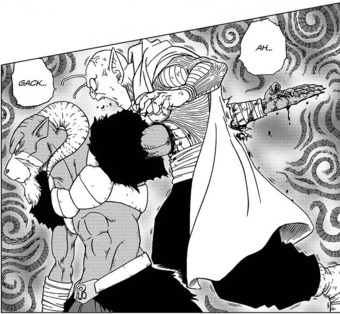
This brings and end to what I’ll call Phase 1 of Super and to a time skip past the battle with Broly (which I would argue was for the same reason the Golden Frieza battle was) and into the Moro arc, which I agree is a great story that brings back a lot of things Super wasn’t doing enough of. It even brings back the meta story structure of the Buu Saga, since the first part is a very Phase 1 storyline and the second half, after Goku and Vegeta are defeated, is much more of a DBZ storyline, just as Kofi described. It’s like saying, “Yeah, we want to pivot away from this, we’re done making that point.” Looking at the first part of the Moro arc, you can read it as a way of reinforcing the grand statement of Phase 1, that the constant jockeying for power and strength and the glorifying of a couple people to the detriment of others is a bad way to write a story. The reason that’s important to say is because that’s the way a lot of the meta canon has been going for a while, at least it seems to me; all the fun, original video game stories are about Saiyans and their super special Saiyan-ness and how super cool strong they can get. It’s why GT was such a disappointment to me, and as I said, it stopped several great characters from trying to become better during DBZ. I think Kofi is right to say moving away from that model of storytelling is a good and important shift in the right direction, though I can’t say if it’s for the same reasons. That’s because, if it’s not clear, I think that what Super did along the way in Phase 1, at least in the manga, was better, more important, and more complex than the simple glorification and valorization of Goku and Vegeta, loaded as it was with themes arguing against that model and continual demonstrations of why they need to switch back to a focus on their martial arts journey. The structure of the Moro arc only serves to reinforce and finalize this thematic argument. As it continues, we are undoubtedly in store for some truly amazing fights and a satisfying, climactic battle with Moro for the entire Dragon Gang.
I also want to make a very important point for how the series is moving forward. Kofi says that Toriyama is switching back to this DBZ style story because he “has learned a thing or two from his mistakes.” For one, the massive success of Super doesn’t really seem like a mistake for anyone to learn from. For two, it’s really in poor taste to imply that Toriyama is changing how he’s writing a story because of negative fan reaction. Allegedly, that sort of thing happened with the Buu Saga, which is why Goku came back and we saw Super Saiyan 3, the perfect continuation and parody of the Super Saiyan form, all because the fans didn’t like Gohan’s high school adventures. I don’t think that’s happening again, allegedly, and in my opinion it’s not exactly a good look to say that it is. For three, that almost literally can’t be what’s happening, because Toyotaro has much greater control over the narrative by now. For those who don’t know, the way Super is being created is that Akira Toriyama writes plot summaries, and then lets the different creatives develop it from there, free to add and subtract and move around what they will. The anime team decided to focus on power and how super cool Goku is, and that version of events reflects that. Toyotaro, artist and co-author of the manga, kept his eye on the martial arts journey while executing this long vision of Toriyama’s to introduce new levels of grandeur and warn against getting lost in it, and that version of events reflects that. Over the course of the series, each creative team was given increasingly greater control over the narrative, leading to greater divergences; the two Tournaments of Power might as well be two different stories. By now, in the Moro arc, with no competing anime version of the story, Toyotaro has much more authorial control than when he started, and that will only increase until, as I hope and predict, Toriyama officially hands off the series to Toyotaro’s capable hands so he can write new stories for the foreseeable future. So no, I don’t think it’s very accurate to say that Toriyama learned any lesson because Toyotaro is the one making the important changes in how the story is told, not Toriyama. Keep your eye on the prize, you know; forgetting Toyotaro’s role means forgetting that we can and probably will have new Dragon Ball that isn’t a video game or video game-related story after the passing of Toriyama. I think the long hiatus of the anime reinforces this: Toriyama has said that if the anime team followed Toyotaro’s lead, they wouldn’t make so many art mistakes, and allowing the manga to develop lead time could be a strategy to follow the manga as a source material in the future, rather than continue this confusing dual path.
So yeah, the Dragon Ball Super manga is better than the anime in every way, and judging the series by the anime alone is setting yourself up for disappointment. The Galactic Patrol Prisoner Saga showcases an amazing villain for the franchise, and it sets up more to explore in a future that values the contributions of the full cast. It also, to my eyes, foreshadows the end of the road for the Dragon Gang we’ve been following so far, and thus a potential new beginning with their successors; I mean, there’s no more time after this between Beerus and meeting Uub to use, and meeting Uub is the moment Goku passes the baton to a successor. This is a time to look forward to that bright future and reflect on the themes the manga has been developing as we head into it, as well as what the two versions of Super mean for the franchise as a whole.
#dragon ball#dragon ball super#Dragon Ball Z#goku#tournament of power#universe 6#zamasu#goku black#jiren#vegeta#moro#Akira Toriyama#toyotaro#manga#anime#comics#comic books
22 notes
·
View notes
Text
Therion's Past: An Insane Meta/Headcanon Post
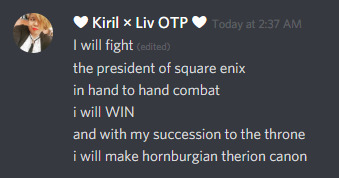
[cracks knuckles] all right I'm taking this literally 2% seriously, almost skim seriously, but this is a very serious headcanon that I refuse to let die until squenix tells me otherwise. So, without further ado, I present:
Hornburgian Therion, Royalty Therion and Both Of Them Put Together In A Clusterfuck of Headcanons I Call Hornburgian Royalty
(Mega spoilers for the entire game, including & especially Gate of Finis!)
Some Note Before We Begin
I make use of biblical allusions and parallels between Therion of Christianity and Therion of Octopath Traveler, mostly near the end, and as neat little conjecture rather than concrete evidence towards my theories. Usually, I’ll more often than not be talking about Therion of Octopath Traveler, but if I ever feel the need to make the distinction (like when talking about both of them in the same sentence), I’ll use C!Therion for the Beast from Christianity, and OT!Therion for the Octopath Traveler character.
Like mentioned before, some of the later bits and pieces will just be conjecture and mutual allusions to add strength to arguments rather than to be held as evidence by itself, so take those with a grain of salt. The larger arguments, however.....I’m very serious about those.
I may have forgotten some things, so pardon if I have to go out and edit this to complete some thoughts that I may have left unfinished. This is close to 3,000 words long and I haven’t proofread it yet.
If you have anything to add regarding anything in this document, feel free to send it my way!
Royalty Therion; Or, The Most Likely Explanation But That's No Fun Now, Is It?
Honestly, it almost feels as though they wanted to hint at this but didn’t do it enough.
Starting off strong character-wise, we’ve got the glaring similarities between Therese and Therion, namely the fact that they’re the only known characters with ‘unnatural’ hair colors in the game- that is to say, silver (and white) hair isn’t normally found in nature, while everybody else has colors ranging from normal blond to black; ‘anime’ colored hair isn’t exactly prevalent in Orsterra. It could be coincidence, but so could everything else and so I like to interpret it as not. Instead, it could be genetics. Bloodline, a recessive gene passed down more easily through the royal family or a branch thereof. Not to mention, mind, that Therion's hair is, if not confirmed, then highly implied to be naturally white. After all, while gaining white hair from shock or mental stress has been used in anime before (my own knowledge only really extending to Allen Walker from D. Gray-Man), it's clearly shown that Therion has white hair before his ordeal with Darius, and not enough is known before their meeting to imply any shock large enough for such a biological change (as unrealistic as it is to begin with). As for hair dye....while enough can be said of a thief not wanting a hair color that sticks out like a sore thumb in the middle of Orsterra (in fact, there’s no strategic benefit, only loss, to dying his hair white), the lack of untouched roots also lends itself to the fact.
Also to note is that Therion actually shares his green eye color not with Therese but with Princess Mary, with whom Therese does also share a biological (if distant) relation.
Another thing I would like to address, while less related to their direct blood lineage, is the similarities in their name. It's mostly just convenient coincidence, but THERion and THERese both have seven letters and begin with the same four letters, albeit with different pronunciations; this could possibly lend itself to a naming trend within the family. Also, while I’ve noted time and time again that Therion is most likely derived from the name of The Beast in Christian lore, the origin of the word itself is quite literally greek for 'beast'. The hunted. Therese can also be derived from Greek. The meaning? 'Huntress'.
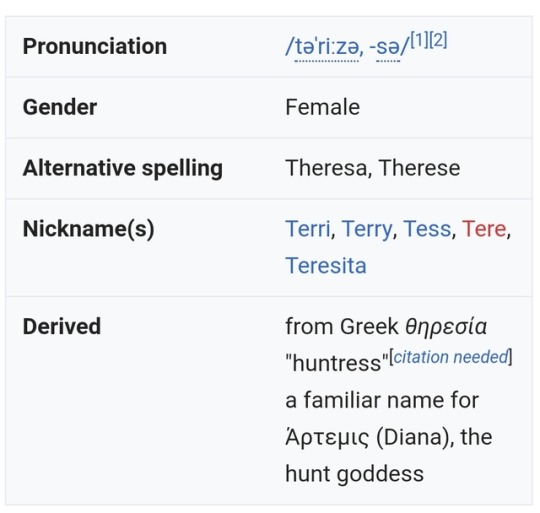
Hunter and hunted. The one who stayed, and the one who ran away. Everybody's names have had some sort of symbolism related to their path, however distinct (Tressa's name quite literally meaning 'third', as she is third in OCTOPATH order, and Ophilia's name is a direct foreshadowing to the death of her father and subsequent madness of her sister) or vague (Alfyn's name relating more closely to his action of chasing after the apothecary from his past, for example), and yet Therion's seems to be out of place. This could be the missing link.
Game mechanics wise, my reasoning gets iffier, but there’s still some evidence, or at least nice potential for world-building, going around. The most notable is the fact that the only known characters who wield swords in-game are trained mercenaries and knights, as well as Therion, who, as far as we know, had only traveled with Darius beginning at age 12. Other NPCs and enemy mobs preferred to use alternative weapons, namely daggers and spears. Sure, you can chalk this up to “okay but OT just needed another sword-using class to balance out the game mechanics”, but that’s no fun. Instead, I offer another explanation: Therion was formally trained in swordplay at a younger age, before he was introduced to Darius who wouldn't be able to teach him due to his own lack of training. Furthermore, because of this small time frame (roughly six years, if Therion started at the tender age of 6 as was the average for similar, real-life medieval societies), it's likely that Therion was either very gifted at swordplay to be able to learn it so quickly, pushed mercilessly by the person training him, or both- all likely assumptions for somebody with a noble birthright.
Hornburgian Therion; Or, More Fun And Also Still Plausible So Just Let Me Have This One Thing, Square Enix
Let's shift our gears here and talk geography for a minute; more specifically, I want to talk about four distinct locations related to both Therion and Hornburg. While the first two may be more obvious, Bolderfall and Hornburg itself, I'll be talking about the other two locations quite extensively as well: Saintsbridge and Riverford. While we know from the guidebook that Therion's first known location was his meeting with Darius in Saintsbridge, this also puts him in close proximity with Riverford- one of the pivotal locations, if not the most pivotal, pertaining to the Fall of Hornburg.
First, the obvious. Bolderfall and Hornburg have very similar geographic makeups; they’re both assumedly dry, arid locations with cliffs and other topologically similar features. Really, that’s all I have to say about that. There is potential for Therion having settled in an area similar to the home that he had lost in the war.
Yeah. That’s all I’ve got.
.....is what I would say, but wait, there’s more! Let’s take a look at the lower lefthand corner of the full map of Orsterra (shoutout to IGN for the high quality image).

We see that three- nay, four important points are located all in this area. “Four, but Hornburg isn’t located here!” No, I’m talking about the Orewell/Quarrycrest area where Darius betrays Therion, but that’s only important with regards to the actual story, not quite this meta, so it won’t be touched upon here.
The first place of importance is Saintsbridge, the city where Therion meets Darius for the first time. The second place, Bolderfall, where Therion begins his story path. And the third, Riverford. Now, the question here is, if Therion were from Hornburg, than how would he have ended up so far into Orsterra?
Riverford is the answer to that question. Riverford is most commonly known as the city where you fight Werner at the end of Olberic’s path; that is to say, he is the number two instigator of Hornburg’s ruin (number one being Lyblac). It’s revealed in the journals found in the Gate of Finis that, while orchestrating the fall of Hornburg, Werner also invests in the trust of ‘powerful men within Hornburg and without’. Adding onto that the fact that Werner has enough prestige and money to buy the entire city of Riverford after Hornburg falls, it would make sense for the area to also serve as an out-of-Hornburg base or otherwise sanctuary for Werner and his men before the fall.
In which case, since Riverford now has ties to Hornburg, how would Therion get there? The simplest answer is that he had arrived of his own free will. After all, Werner had been recruiting both mercenaries and ruffians alike, and a thief like Therion would surely be on Werner’s radar (granted his young age, however, this may not hold as much water). While serving under Werner, either as a ‘villain’ in his little act or as a courier or other role suited for a fleet-footed thief, there’s potential for Therion to travel back and forth between Riverford and Hornburg, therefore giving him a reason to be in both Riverford and Saintsbridge, as the next city on the road towards Hornburg (at least, considering the impassable terrain between Riverford and Marsalim).
The second answer, and I’ll go over this in the next section, is a little more extreme.
Therion was abducted.
Hornburgian Royalty AU; Or, Put On Your Pirate Hats Because We’re Sailing Into Crack Theory Territory Now Boys (Actually There’s A Lot Of Allusions And Parallels So Strap In We’re Going Meta-Diving)
Let’s put this all together, now. We’ve got Royal Therion and Hornburgian Therion. Why not both? However, while we can pull a few things from both previous headcanons - namely the knowledge of swordplay from Royal Therion and the geographical preference from Hornburgian Therion - there’s also one more story-based piece of information I want to look at.
Namely, the connection between Therion and Beowulf I, the first king of Hornburg.
I’m gonna pull these two pieces from The Records of House Ravus specifically as a basic gist of my reasoning:
“The dragonstones were bestowed upon the first Lord Ravus by the legendary King Beowulf I of Hornburg, and they have been passed down in our family ever since.”
[.....]
“It is said that the great sorcerer Odin Crossford used the power of the dragonstones to seal shut the Gate of Finis. Crossford had campaigned together with King Beowulf and aided him in the founding of Hornburg.”
There is a lot of allusion and generational referencing of the original closing of the Gate within the journals for the Gate of Finis, and this is only part of the excerpt itself. Odin Crossford, King Beowulf, and Lord Ravus are all tied into the lore behind the Dragonstones here, and we’ve obviously seen why the names Crossford and Ravus are so important (especially considering their kin also play major roles in the plot). King Beowulf gives the dragonstones to Odin Crossford to seal the Gate of Finis, and those dragonstones then go to the first Lord Ravus for safekeeping. We see that the most recent Lord Ravus (Cordelia Ravus’s father, assumedly) loses the dragonstones during a family strife, which connects the past Ravus to the future. Obviously, Graham and Kit Crossford act as two different keys to opening the Gate of Finis, which parallel Odin Crossford closing the Gate. So here we have a cyclical series of events, but there’s one thing missing. King Beowulf doesn’t have a seemingly present-day counterpart.....but who gave the dragonstones to the Ravus family?
Or a better question is, who gave the dragonstones to the Ravus family after he retrieved them all during the events of the game?
Now, we know that Cordelia is related to the first Lord Ravus through direct lineage; the same can be said for Graham (and Kit by extension) being directly related to Odin. Through this series of parallels, it also wouldn’t be a stretch to say that Therion, despite lacking a proper (known) surname, could also be related to the first King Beowulf (also without a surname, mind you, just as the late King Alfred is without a known surname) through direct blood lineage because of this parallel of roles.
I CAN ALSO GO INTO HOW THE NAME THERION, DESPITE MEANING ‘BEAST’, IS ALSO THE GREEK NAME GIVEN TO THE CONSTELLATION LUPUS, AKA THE WOLF, LIKE, Y’KNOW, IN BEOWULF, BUT I DON’T WANNA SOUND LIKE A CONSPIRACY THEORIST OR ANYTHING...........
........there’s actually a lot of real-life allusions connecting both Beowulf and Therion, including the role of dragons (although this one is shaky at best when you compare the dragon that mortally wounds Beowulf in the eponymous poem, directly opposed to the ‘dragon’ said to bestow power on C!Therion) and the role of royalty and divine power (also interesting to note that, while Beowulf from the poem is a direct king, C!Therion represents a king who is not and never was, leading back to possibly alluding OT!Therion as some sort of punished or escaped royalty). Literally all of this is pointless trivia, though, and doesn’t serve as hints or proof, but rather interesting tidbits that could lend itself to some alluded connection between the two. In other words? None of it matters, but I like to pretend it does.
Speaking of names, have you noticed the similarity between the pronunciations of Therion and Ferien, the kingdom that King Beowulf I was prince of before founding Hornburg? Because I did. It’s weird. Absolutely pointless to mention, but still really weird.
Supplement: Hornburg’s Collapse; Or, Erhardt, Darius, And Where Everything Fucking Fits
I’m not going to go into too much detail here, but with regards to specifically Hornburg Royalty, this is a hypothetical order of events; everything labeled to the furthest left is concrete canon, while every indented bullet is conjecture and theory. This is also where I go into a bit more detail about Therion’s kidnapping and subsequent arrival in Orsterra.
T-22: Therion is born
T-21: Erhardt’s village burns down
T-20: Werner forms the Black Brotherhood; this is the earliest possible moment for Erhardt to join the Black Brotherhood.
T-17: After three years of gathering intelligence, Werner begins to enact his plans; this is the earliest possible moment for Erhardt to join the royal guard.
T-17 - T-10: Somewhere in this time frame:
Hornburg falls victim to a war (civil war?)
Therion is abducted and taken to Riverford- potentially by Werner, but also potentially by Lyblac or another one of her cohorts
Therion subsequently escapes from Riverford and arrives in Saintsbridge, where he gets imprisoned
T-10: Therion meets Darius in Saintsbridge jail
T-8: Hornburg Falls
T-8 - T: Somewhere in this timeframe:
Erhardt travels to Wellspring
Olberic finds refuge in Cobbleston
T-6: Darius Betrays Therion
T: Present-Day Octopath
That leaves a ten-year gap (from T-20 to T-10, but mind you, Therion is two at the start of that gap, so it’s highly unlikely the timeframe is quite that large) for Therion to learn swordsmanship and thievery skills and ‘go missing’. Within that gap, Therion would also have to have been kidnapped, either by Werner or Lyblac. While Werner is much more active in the plot against Hornburg, it is equally likely that Lyblac is the one to ‘dispose’ of Therion; it would give reason for Therion to have been taken care of despite Werner’s lack of knowledge of the king having an heir, and would equally give reason for Therion to lack memories of being kidnapped by Lyblac, because something something goddess powers.
Takeaway; Or, Kiril Is Fucking Crazy, Seriously, You Don’t Have To Sugarcoat It, I Know Already
Nah, for real bro, I know almost all of this is based on pointless coincidences and pushpin-string evidence, but it’s something that’s been in my mind ever since I first played through the game last July. I guess I just......needed an outlet, and wanted to get this out before
And on the off chance that this is real? That somehow, no matter how small or insignificant, I managed to hit a single nail on the head with some of this conjecture and crack theory levels of reasoning?
YEAH FUCK Y’ALL, I KNEW IT THIS WHOLE FUCKIN’ TIME.
#octopath#octopath traveler#therion#c. therion#hc. therion#i know there's not much basis for hornburgian royalty therion but listen.......#i'm taking this headcanon to this hill and fucking dying there
18 notes
·
View notes
Note
Serious non-troll: What if you like the cop-outs and the scrambled bullshit plots and the nonsense towers of half-constructed ideas? I agree that for example Nomura is a goddamn crazy person but I find his convulsions fascinating and want to see more of them.
i mean, you’re entirely within your rights to do that. it’s just frustrating that there’s visibly no effort put into any of it, and he’s just writing for the sake of what makes the trailer look good, and that’s been 100% to the detriment of the story ever since he’s started doing it
i’m not even inherently opposed to ridiculous convoluted bullshit. i’m one of those pretentious fuckheads that unironically likes End of Evangelion and thinks it made perfect sense, obviously, duh, with all its absolute nonsense of adam and lilith and rei being a god-analogue from absorbing both the white and black seeds and allowing shinji to dictate the ultimate outcome of third impact in the culmination of a couple of really fucking long and extremely obtuse character arcs. i mean, hell, i’m 38 chapters into a fic that is running off nothing but weird high-concept ideas of how reality and parallel universes work and abstract metaphor andsleep deprivation. in any other circumstances, i’m fine with convoluted batshit nonsense.
i think the best way to explain the heart of the issue is to look at what happened to the matrix trilogy. or actually wait this is tumblr, everyone’s in high school and would’ve been foetuses or something when Revolutions came out. homestuck, then. we’ll look at homestuck.
okay so homestuck. remember when that was as big as it was? initially, the big stumbling block was the slow pace of act 1 where john just kind of fucks around throwing glass at clown dolls for a while and if you weren’t into that kind of humour that was where the comic immediately lost you, but what ultimately got the ball rolling was [S] WV: Ascend. the general metric back then was if you weren’t hooked by that one, you wouldn’t like homestuck at all, and for many people that was the point of no return. the reason WV: Ascend was as big of a deal as it was is that we’ve been seeing a bunch of disconnected nonsense happening all over the place, and this is the first time we see our first major time loop actually closed, with the promise of a few more being set up. all that supposed joke nonsense we’d been watching the whole time? it actually mattered, surprise! from there, the narrative spends a lot of time introducing a lot of new concepts – we have captchaloguing and paradox slime, and time travel, and doomed timelines, and exiles and future versions of planets from a parallel universe the metanarrative being perpetuated by the author being diagetic and fuck knows what other things i’m forgetting about. and then, to throw you for a loop twelve whole other characters show up on top of that. so then the narrative needs to spend time establishing who these people are and what their relevance to the story is – which it does, by having them be active participants in the first arc as things go on. this ultimately culminates in [S] Cascade, where we see all these different concepts eventually tie into one another because they were deliberately set up to, and it’s at that point that you figure, well shit we’ve hit a point where all the time travel stuff has finally come to a head. and with it, you’d expect it to also bring all the character stuff to a head too, but instead hussie has an entire extra act to go so we can’t have that resolve yet.
so in the meantime, here are 20-ish whole other characters doing some other things. but we don’t have time to establish what’s effectively the silmarillion by now, so we have to speed past it, meaning we aren’t given a chance to care about these new people. but we can’t have a chance to care about them either, because we still have to tie all this into 5 whole previous acts that are meant to feed into this. at this point, homestuck is visibly collapsing under its own weight. character arcs are forced to fart around in circles because the status quo can’t change because we still need to make it to endgame with these character dynamics more or less intact. but that’s boring to read so we’ll do this entire “what if” thing and then retcon it all out of existence, and then have the fact that you can retcon things suddenly become vital to the resolution of the coming in place of anything we’ve already established previously – not the time travel, not the parallel universe with the trolls, not even the whole thing with the Scratch leading to the alpha kids being here in the first place – when the mechanic was only introduced in the first place to sloppily patch a story together that had long since devolved into infodumps that served to paint hussie further and further into a corner as he was forced to define his lore to get the plot to keep moving forward despite the fact that the narrative wasn’t focusing properly on the people that could make that happen anymore because the story had since switched focus from those people almost entirely.
and in the meantime the damn thing got eaten up by filler, and suddenly characters from that filler are showing up like they were totally relevant to the main story the whole time even though literally nothing they did in their own subplot had any direct bearing on the story at large, unlike the initial 12 trolls. why yes, Alternate Universe Calliope was a completely necessary addition to the story! didn’t you see our important sidestory thing where they do Stuff, and then her showing up in the climax to resolve some other things that are sorta disconnected from the main plot anyway?
not to mention the shipping. nothing ruins a story faster than throwing in a love triangle or eight, and then immediately invalidating all the character growth that happened on top of that anyway by having it literally never happen. not that it would’ve mattered anyway, because remember, we never actually got to have any of this really developed to begin with.
by the time we hit end of act 6, there’s been so many new concepts haphazardly stapled onto the story and so many threads brought up and discarded entirely when we already established back with [S] Cascade that the story works best when they actually do this and it is doable, that it stops being merely complicated and off the wall, and starts being spread too thin, incomprehensible, and ultimately no longer part of a whole narrative deliberately comprised of interlocking storylines. shit’s just kinda happening at you, and rather than getting to see parts of a text interacting as a result of them coming from somewhere for the express purpose of then going to somewhere, you’re just being asked to accept that, yup, that’s a thing that’s going on right now. neato. sure is some stuff happening and whatnot. and in the end, for all that posturing, it didn’t even do anything. in pre-cascade homestuck that wouldn’t have even been a full flash. a bunch of nonsense happens, and then They Fightan Good, and then it’s over and there’s not a single time paradox or meta-interaction to be found. none of the stuff they built up to over all these years mattered, and neither did any of the stuff they just threw in, either.
i’m sure you see what i’m getting at with this.
(also he treats the women in his stories like shit and quite frankly i’m sick of it and even more sick that people keep giving him a pass for it because it’s practically reached parody levels at this point , so there’s that)
i have no problem with convoluted twisty bullshit in and of itself. but it has to accomplish something aside from just existing, and nomura doesn’t do that. by his own admission, kingdom hearts wasn’t planned, and it shows really badly. characters and entire story mechanics and plot lines are introduced solely for the sake of introducing them. they don’t go anywhere or build to anything, because they can’t, because fuck we have to stall for kh3 shhhh just keep adding more soras and hopefully no one will notice. i think the last time any of this actually mattered was kh2, and even that had a lot of the issues i’ve mentioned here. as a result of all of this, the character arcs suffer a lot, and you’re left with nothing but a big ball of plot twists that goes nowhere, and a bunch of characters that only somewhat have anything to do with any of it.
i don’t feel like it’s overly nitpicky to find this kinda gross and seriously insulting of the audience’s intelligence. it’s just lazy time-stalling. i get that people sometimes really don’t care about stuff like narrative and character development and are just here to see riku punching mike wazowski in the teeth or whatever, but i think it’s disingenuous to pretend that these aren’t nonetheless important parts of a game’s construction – especially a studio that used to openly pride itself on selling games with a focus on story.
and the genuinely frustrating part is, no one cares. people are gushing all over everything square puts out because it’s square, so they know they don’t have to put effort into their stories. i’m well aware i’m in the minority for saying that these games are bad. but i also thought we were done with treating, “it’s just a video game, bro! why do you care so much about the story having quality as a narrative? this isn’t an english class!” as a valid rebuttal.
maybe i should’ve used the matrix trilogy instead. most people hate movies 2 and 3 for the weird “YOU’VE ALREADY MADE THE CHOICE/EVERYTHING THAT HAS A BEGINNING HAS AN END NEO” shit and the bonkers christ-allegory ending. i hate it because neo is about as interesting as the rock that cracked goofy’s skull open.
#asks#kangdan horfs#do i put this in the discourse tag even though its's not vii?#squid alienates kh fans#that's a tag now#hamsteak#Anonymous
4 notes
·
View notes
Note
talk to me about caranthir and khuzdul
let’s talk about meta, baby || accepting
aw yeah, feanorians and language, my favorite topic! i’mma write this, and intersperse it with relevant quotes from various books of HoME, yeah? yeah.
okay okay okay. so. the dwarves are known to be a secretive people, who generally did not teach their language to others, while at the same time preserving it themselves and passing it along to their children, even after, in some cases, it was no longer a native tongue but a book-learnt one. it’s also a very difficult language, even if you can get someone to teach you.
“The Dwarves were in many ways a special case. They had anancient language of their own which they prized highly; andeven when, as among the Longbeard Dwarves of the West, ithad ceased to be their native tongue and had become a ‘book-language’, it was carefully preserved and taught to all theirchildren at an early age. It thus served as a lingua francabetween all Dwarves of all kinds; but it was also a writtenlanguage used in all important histories and lore, and in record-ing any matters not intended to be read by other people. ThisKhuzdul (as they called it), partly because of their nativesecretiveness, and partly because of its inherent difficulty, wasseldom learned by those of other race.”
however, there is some canon on the fact that the secretiveness is not 100%; for one thing, Adûnaic, which itself derives from Taliska (being the language of Hador and Beor), bears a strong resemblance, in places, to Khuzdul, indicating that at some time in the past, the dwarves and early Men were close enough that their languages influenced each other.
“This gave rise to the theory (a probable one) that inthe unrecorded past some of the languages of Men - includingthe language of the dominant element in the Atani from whichAdunaic was derived - had been influenced by Khuzdul.”
and further, there’s evidence that not all the dwarves were as secretive as the others; the Longbeards seem to have been the most reclusive, but the dwarves Caranthir would have known were more likely to be the Firebeards and Broadbeams.
“…of whom the Longbeards appear to have been themost secretive and least concerned to have dealings with Elves orMen”
“Since the ancestors of the Firebeards and the Broadbeams awokein the Ered Lindon, these kindreds must be presumed to be theDwarves of Nogrod and Belegost.”
now, the canon does specifically state that only Curufin was really interested in learning Khuzdul, being the most like Fëanor himself and therefore the most linguistically-inclined. and so he’s really the main source of knowledge that the Noldor loremasters have on Khuzdul.
“His sons were too occupied in war and feuds to pay attentionto such matters, save Maglor who was a poet, and Curufin, hisfourth and favourite son to whom he gave his own name; butCurufin was most interested in the alien language of the Dwarves,being the only one of the Noldor to win their friendship. It wasfrom him that the loremasters obtained such knowledge as theycould of the Khuzdul.”
but that said, Caranthir had traffic with the dwarves of Belegost and possibly Nogrod for at least 300 or so years. traffic in which both sides found great profit, and you know what you need to do when you’re trading with people? talk to them. and, i’ll say, despite the quote above where it states Curufin was the only one of the Noldor to win the friendship of the Dwarves, there’s also this, from elsewhere in the canon (emphasis mine):
“…since those of Belegost to the north had become friends of Caranthir son of Feanor.'”
(and also the fact that Maedhros had evidently befriended Azaghâl, but that’s entirely a different post altogether.)
and one final reference…
“…Lake Hele(d)vorn nearthe Dwarf-regions in the north of Dor Caranthir [Thargelion]: itmeans “black glass”, and is probably also a translation of a Dwarf-name…”
so they know at least some isolated words of Khuzdul, because they’ve given landscape features names which are direct translations of Khuzdul names.
basically this is all a very long winded way of saying that i find it, given this body of references and canon, extremely unlikely that Caranthir, a Noldor with a background in linguistics and language acquisition and a strong and centuries-long commerce with a group of Dwarves not specifically noted to be overly secretive, would not have known Khuzdul.
or at least some of it. fluent? unlikely; there was no reason (nor actual desire) for him to expend the effort of learning it fluently. but the basics? simple syntax and grammar, important or common words, maybe a few fancier ‘ceremonial’ or formal phrases? (cursewords?) definitely all of that. Curufin was the only one who studied it, but Caranthir would know it.
#cllgood#meta || caranthir#you: talk to me about....#me interrupting by slamming book references in your face: OKAY SO LISTEN ---!!!!
5 notes
·
View notes